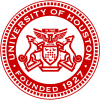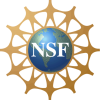 NeTS: Medium: Collaborative Research:
NeTS: Medium: Collaborative Research:
Riding the Stress Wave: Integrated Monitoring, Communications, and Networking for Subsea Infrastructure
Project Information
- NeTS: Medium: Collaborative Research: Riding the Stress Wave: Integrated Monitoring, Communications, and Networking for Subsea Infrastructure, National Science Foundation, September 1, 2018 – August 31, 2021. This is a collaborative project of University of Houston (PI: Dr. Miao Pan, Co-PIs: Drs. Gangbing Song, and Jiefu Chen), University of Alabama (PI: Dr. Aijun Song), and Texas Southern University (PI: Dr. Xuemin Chen).
- This webpage and the materials provided here are based upon work supported by the National Science Foundation.
Project Synopsis
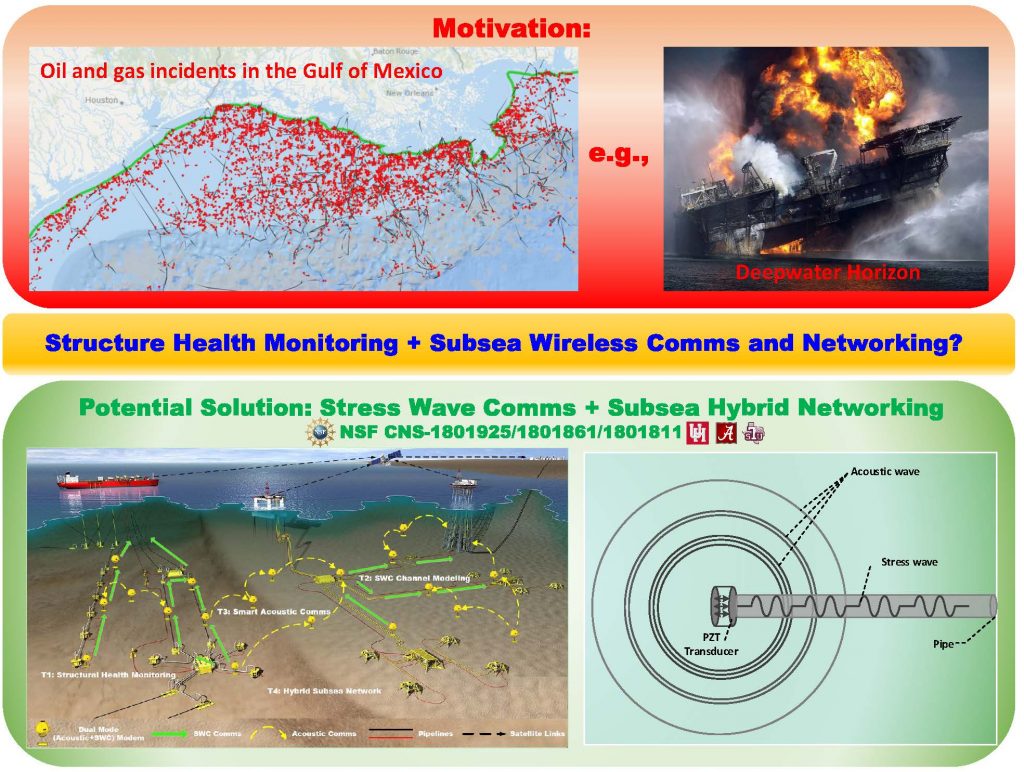 Thousands of miles of pipelines crisscrossed on the Gulf of Mexico sea floor comprise the veins for offshore oil and gas industry of the United States. Leaks and ruptures of those pipelines can lead not only to staggering economic loss but also environmental disasters. The goal of this proposal is thus to effectively monitor subsea infrastructure such as offshore pipelines, and efficiently deliver sensed information in subsea environment. To provide a viable solution, we plan to integrate piezoelectric transducers/actuators designs, acoustic communications, stress wave communications, and hybrid networking, and conduct experiments and field tests to validate the proposed scheme. Such a vision needs efforts from both engineering and scientific perspectives, and questions we seek to answer include: (i) How to utilize piezoelectric transducers for a concurrent execution of stress wave communication (SWC) and structural health monitoring for subsea pipelines. (ii) How to characterize the stress wave propagation and reflection in a pipeline network with multiple segments and joints, and how to conduct communication channel modeling. (iii) How to achieve optimized rates-reliability trade-off via transmitter adaptivity in short range acoustic communications. (iv) How to exploit the subsea infrastructure to form a stress wave assisted hybrid subsea network to improve transmission performance in terms of end-to-end throughput, power efficiency, delay, and so on.
Thousands of miles of pipelines crisscrossed on the Gulf of Mexico sea floor comprise the veins for offshore oil and gas industry of the United States. Leaks and ruptures of those pipelines can lead not only to staggering economic loss but also environmental disasters. The goal of this proposal is thus to effectively monitor subsea infrastructure such as offshore pipelines, and efficiently deliver sensed information in subsea environment. To provide a viable solution, we plan to integrate piezoelectric transducers/actuators designs, acoustic communications, stress wave communications, and hybrid networking, and conduct experiments and field tests to validate the proposed scheme. Such a vision needs efforts from both engineering and scientific perspectives, and questions we seek to answer include: (i) How to utilize piezoelectric transducers for a concurrent execution of stress wave communication (SWC) and structural health monitoring for subsea pipelines. (ii) How to characterize the stress wave propagation and reflection in a pipeline network with multiple segments and joints, and how to conduct communication channel modeling. (iii) How to achieve optimized rates-reliability trade-off via transmitter adaptivity in short range acoustic communications. (iv) How to exploit the subsea infrastructure to form a stress wave assisted hybrid subsea network to improve transmission performance in terms of end-to-end throughput, power efficiency, delay, and so on.
Personnel and Collaborators
Personnel at UH
- Dr. Miao Pan, PI
- Dr. Gangbing Song, Co-PI
- Dr. Jiefu Chen, Co-PI
- Mr. Chenpei Huang, PhD Student
- Mr. JiAn Chen, PhD Student
- Mr. Hamdi Ben Amar, PhD Student
- Mr. Himansu Shaw, PhD Student
- Dr. Debing Wei, PhD (Graduated 2021)
- Dr. Sihong He, PhD (Graduated 2022)
- Dr. Li Yan, PhD (Graduated 2022)
- Dr. Chaoxian Qi, PhD (Graduated 2022)
- Ms. Jasleen Kaur, MS Student
- Mr. Nikolas Reuter, MS Student
- Ms. LaShae Clarke, Undergraduate Student (REU)
- Mr. Nhat Nguyen, Undergraduate Student (REU)
- Ms. Mugdha Sai Bhagavatula, Undergraduate Student (REU)
Personnel at UA
- Dr. Aijun Song, PI
- Mr. Qiang Fu, PhD Student
Personnel at TSU
- Dr. Xuemin Chen, PI
- Ms. Mingchi Zhang, MS Student
Research Progress and Outreach Activities
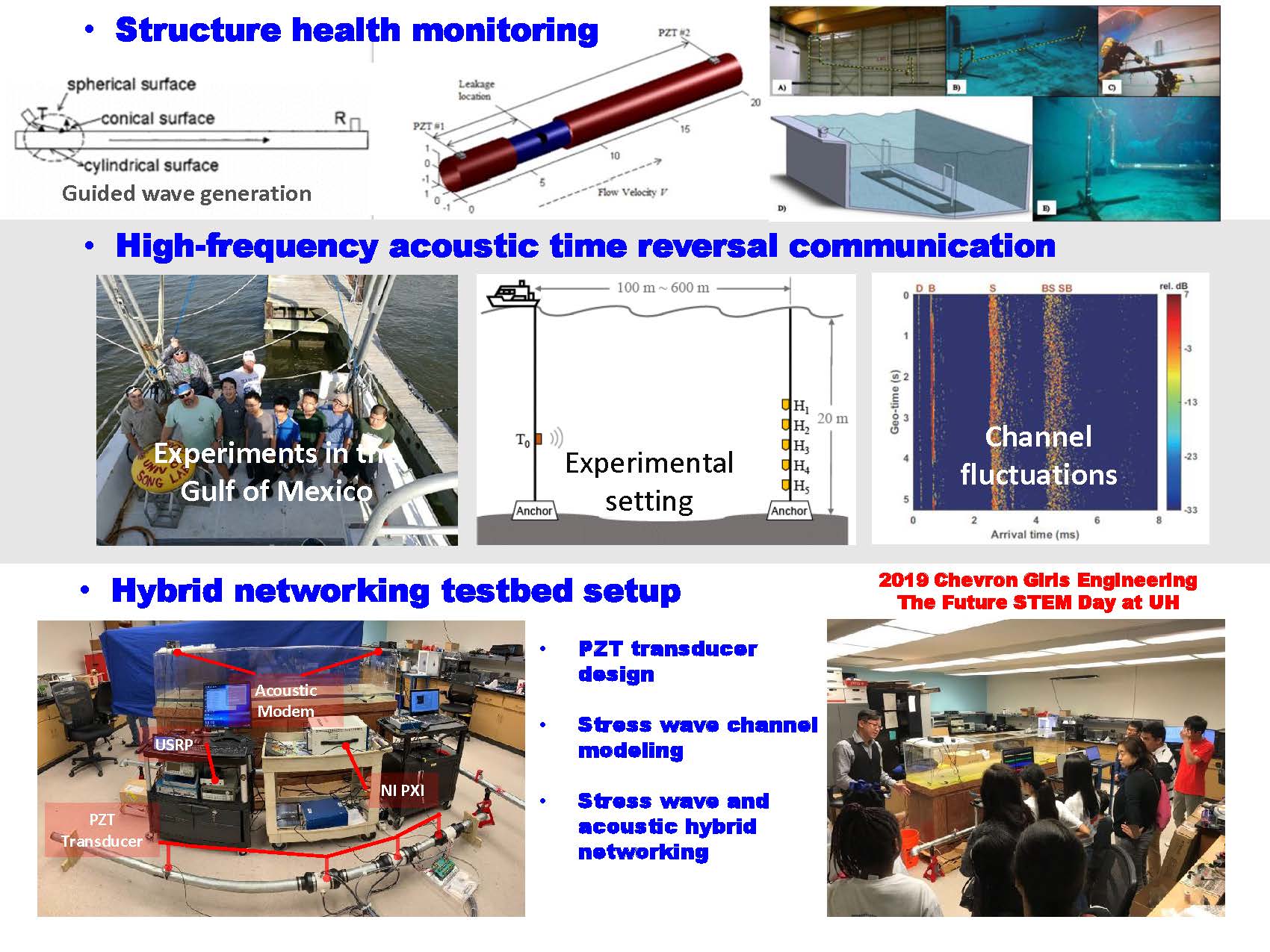
Research Collaboration and Idea Exchange
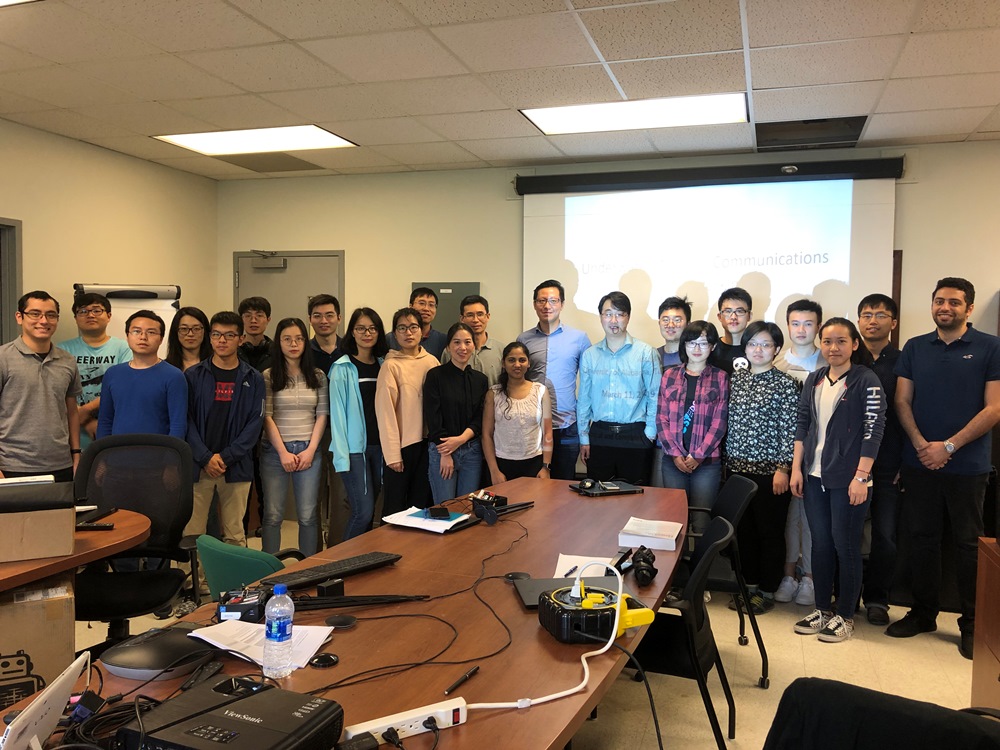
Prof. Aijun Song at UA visited UH team and delivered a talk in March 2019.
Selected Collaborative Research Outcomes between UH and UA
- Debing Wei, Chaoxian Qi, Jiefu Chen, Aijun Song, Gangbing Song, and Miao Pan, “Pipe Data Through the Water: Stress Wave Communications Along Pipelines”, ACM International Conference on Underwater Networks and Systems (WUWNet’19), Atlanta, GA, October 23-25, 2019.
- Qiang Fu, Aijun Song, Qiuyang Tao, Fumin Zhang, and Miao Pan “Virtual MIMO for Multiuser Underwater Acoustic Communication in Moving Platform”, ACM International Conference on Underwater Networks and Systems (WUWNet’19), Atlanta, GA, October 23-25, 2019.
- Qi, Chaoxian and Huang, Chenpei and Egarguin, Neil Jerome and Onofrei, Daniel and Pan, Miao and Chen, Jiefu “Enhanced Underwater Acoustic Communication via Active Field Control”, ACM International Conference on Underwater Networks and Systems (WUWNet’21), Shenzhen, China/Virtual, November 22-24, 2021.
- Huang, Chenpei and Qi, Chaoxian and Song, Aijun and Song, Gangbing and Chen, Jiefu and Pan, Miao “A Low Complexity Aggregation Method for Underwater On-Pipe Sensor Network”, ACM International Conference on Underwater Networks and Systems (WUWNet’21), Shenzhen, China/Virtual, November 22-24, 2021.
Selected Collaborative Research Outcomes between UH and TSU
- The Texas Southern University (TSU) team applied the hidden Markov models (HMMs) for pipeline leakage detection and published two journal papers entitled “Hidden Markov models for pipeline damage detection using piezoelectric transducers” and “A hybrid hidden Markov model for pipeline leakage detection” in 2021. Our research findings show that applying HMMs and hybrid HMM for pipeline leakage detection is feasible with high accuracy. This conclusion was drawn from the laboratory experiment results. The effectiveness of proposed methods for pipeline leakage detection in subsea environments are yet to be investigated. Since this is collaborative research, the PI at TSU collaborated with project Co-PI (Dr. Gangbing Song) at the leading university, University of Houston, published two conference papers. The first conference paper entitled “Fatigue Crack Width Detection Based on the Active Sensing Method: A Feasibility Study” was published in the Proceedings of 16th IEEE International Conference on Networking, Sensing and Control (ICNSC 2019). The second conference paper entitled “Debonding Detection in Carbon Fiber Reinforced Polymer Plate Repaired Steel Beam Using Percussion and Gaussian Mixture Model Clustering” was presented at the 2022 International Conference on Cyber-physical Social Intelligence (ICCSI 2022) in November of 2022. The ICCSI 2022 conference proceedings has been submitted to IEEE Xplore for publication. In addition, we applied the HMMs for applications in cybersecurity. A journal paper entitled “A discrete hidden Markov model for SMS spam detection” was published in 2020. Two collaborative research proposals were submitted to NSF EiR program with Prairie View A&M University. The project PI, Xuemin Chen, led the TSU team to propose applying the HMMs for cyberattack categorization and using Markov decision procession (MDP) for anti-cyberattack resource allocation optimization in 2020 and 2021. The proposals were rated “Competitive”. However, they were not funded.
- The project participant, Mingchi Zhang, completed her research for master thesis “Hidden Markov Models for Pipeline Damage Detection”. She successfully defended her thesis and graduated from TSU in December of 2020.
- The machine learning method used in this project, i.e., hidden Markov models, has been integrated into TSU undergraduate’s Artificial Intelligence (CMET 438) course by PI. A new course proposal that changes Artificial Intelligence (ECE 436) in electrical and computer engineering (ECE) program to Machine Learning was proposed by PI. It has been approved by department and college. Currently, it has been submitted to the university curriculum committee for approval. The new course syllabus has been developed by PI. The HMMs will be taught as sequential data modeling methods for supervised and unsupervised learning. In addition, the hidden Markov models have been included in the Machine Learning course taught by Dr. Gangbing Song (a Co-PI at University of Houston, the project leading university) in 2021 and 2022 fall semesters. PI has prepared a PowerPoint file with Python code for this chapter.
-
Two additional experimental apparatus of pipelines are set up in Dr. Song’s laboratory. The first one is a 60-ft-long model PVC pipeline with piezoceramic transducers and a controllable leakage, and this one was mainly used to investigate the unified stress-wave based communication and leakage detection on a pipeline. The second one is a 500-ft-long PVC pipeline that can simulate impact detection, leakage detection, stress-wave based communication, and structural health monitoring. Both pipelines will help UH and TSU bring closer the developed algorithms to practical applications beyond this NSF project.
- Ning Li, Xuemin Chen, and Gangbing Song. “Fatigue Crack Width Detection Based on the Active Sensing Method: A Feasibility Study”, IEEE 16th International Conference on Networking, Sensing and Control (ICNSC). IEEE, 2019.
- Yong Xu, Ji-An Chen, Xuemin Chen, and Gangbing Song, “Debonding Detection in Carbon Fiber Reinforced Polymer Plate Repaired Steel Beam Using Percussion and Gaussian Mixture Model Clustering”, International Conference on Cyber-Physical Social Intelligence (ICCSI’22), Nanjing, China, November 18-21, 2022.
- Mingchi Zhnag, Xuemin Chen, and Wei Li. “Hidden Markov models for pipeline damage detection using piezoelectric transducers.” Journal of Civil Structural Health Monitoring, vol. 11, no. 3, pp 745-755, 2021.
- Mingchi Zhang, Xuemin Chen, and Wei Li. “A hybrid hidden Markov model for pipeline leakage detection.” Applied Sciences, 11, no. 7, 3138, 2021.
Full Publication List
- Debing Wei, Li Yan, Xuanheng Li, Jie Wang, Jiefu Chen, Miao Pan, and Yahong Rosa Zheng, “Ferrite Assisted Geometry-Conformal Magnetic Induction Antenna and Subsea Communications for AUVs”, IEEE Global Communications Conference (GLOBECOM’18), Abu Dhabi, UAE, December 9-13, 2018.
- Debing Wei, Steban Soto, Javier Garcia, Aaron Becker, Li Wang, and Miao Pan, “ROV Assisted Magnetic Induction Communication Field Tests in Underwater Environments”, ACM International Conference on Underwater Networks and Systems (WUWNet’18), Shenzhen, China, December 3-5, 2018.
- Debing Wei, Chaoxian Qi, Jiefu Chen, Aijun Song, Gangbing Song, and Miao Pan, “Pipe Data Through the Water: Stress Wave Communications Along Pipelines”, ACM International Conference on Underwater Networks and Systems (WUWNet’19), Atlanta, GA, October 23-25, 2019.
- Qiang Fu, Aijun Song, Qiuyang Tao, Fumin Zhang, and Miao Pan “Virtual MIMO for Multiuser Underwater Acoustic Communication in Moving Platform”, ACM International Conference on Underwater Networks and Systems (WUWNet’19), Atlanta, GA, October 23-25, 2019.
- Chaoxian Qi, Debing Wei, Miao Pan, and Jiefu Chen, “Underwater Wireless Communication Using Coil-Based Magnetic Induction”, IEEE International Symposium on Antennas and Propagation and North American Radio Science Meeting (IEEE AP-S/URSI’20), Montreal, Canada, July 5-10, 2020.
- Ning Li, Xuemin Chen, and Gangbing Song. “Fatigue Crack Width Detection Based on the Active Sensing Method: A Feasibility Study”, IEEE 16th International Conference on Networking, Sensing and Control (ICNSC). IEEE, 2019.
- Tian Xia and Xuemin Chen. “A Discrete Hidden Markov Model for SMS Spam Detection”, accepted by Applied Sciences.
- Sihong He, Ning Wang, Michael Ho, Junxiao Zhu, and Gangbing Song, “Design of a New Stress Wave Communication Method for Underwater Communication”, accepted by IEEE Transactions on Industrial Electronics.
- Neil Jerome Egarguin, Daniel Onofrei, Chaoxian Qi, and Jiefu Chen, “Active manipulation of Helmholtz scalar fields: Near field synthesis with directional far field control”, accepted by Inverse Problems.
- Neil Jerome Egarguin, Shubin Zeng, Daniel Onofrei, and Jiefu Chen, “Active control of Helmholtz fields in 3D using an array of sources”, accepted by Wave Motion.
- Jun Liu, Xinqi Du, Junhong Cui, Miao Pan, and Debing Wei, “Task-oriented Intelligent Networking Architecture for Space-Air-Ground-Aqua Integrated Network”, accepted by IEEE Internet of Things Journal.
- Debing Wei, Li Yan, Chenpei Huang, Jie Wang, Jiefu Chen, Miao Pan, and Yuguang Fang, “Dynamic Magnetic Induction Wireless Communications for Autonomous Underwater Vehicle Assisted Underwater IoT”, accepted by IEEE Internet of Things Journal.
- Yong Xu, Ji-An Chen, Xuemin Chen, and Gangbing Song, “Debonding Detection in Carbon Fiber Reinforced Polymer Plate Repaired Steel Beam Using Percussion and Gaussian Mixture Model Clustering”, International Conference on Cyber-Physical Social Intelligence (ICCSI’22), Nanjing, China, November 18-21, 2022.
- Mingchi Zhnag, Xuemin Chen, and Wei Li. “Hidden Markov models for pipeline damage detection using piezoelectric transducers.” Journal of Civil Structural Health Monitoring, vol. 11, no. 3, pp 745-755, 2021.
- Mingchi Zhang, Xuemin Chen, and Wei Li. “A hybrid hidden Markov model for pipeline leakage detection.” Applied Sciences, 11, no. 7, 3138, 2021.
-
Qi, Chaoxian and Huang, Chenpei and Egarguin, Neil Jerome and Onofrei, Daniel and Pan, Miao and Chen, Jiefu. (2021). “Enhanced Underwater Acoustic Communication via Active Field Control.” The ACM International Conference on Underwater Networks & Systems.
-
Huang, Chenpei and Qi, Chaoxian and Song, Aijun and Song, Gangbing and Chen, Jiefu and Pan, Miao. (2021). “A Low Complexity Aggregation Method for Underwater On-Pipe Sensor Network.” The ACM International Conference on Underwater Networks & Systems.
-
Wei, Debing and Qi, Chaoxian and Song, Aijun and Song, Gangbing and Chen, Jiefu and Pan, Miao. (2021). “Reverberating Stress Wave Channel Capacity in Pipe Communications.” ICC 2021 – IEEE International Conference on Communications.
-
Wei, Debing and Qi, Chaoxian and Huang, Chenpei and Chen, Jiefu and Song, Aijun and Song, Gangbing and Pan, Miao. (2021). “Riding Stress Wave: Underwater Communications Through Pipeline Networks.” IEEE Journal of Oceanic Engineering.
-
He, Sihong and Zhang, Guangmin and Song, Gangbing. (2022). “Design of a networking stress wave communication method along pipelines.” Mechanical Systems and Signal Processing. 164 (C) 108192.
- Qi, C., Zeng, S., Egarguin, N. J. A., Onofrei, D., & Chen, J. (2024). “Active control of electromagnetic fields in layered media.” Journal of Electromagnetic Waves and Applications, 38(1), 66–88.
Links to Code Repositories
- Github Code Links: https://github.com/C3Lab-code/StressWave.git
- NSF-PAR ID: 10107518, 10182498

